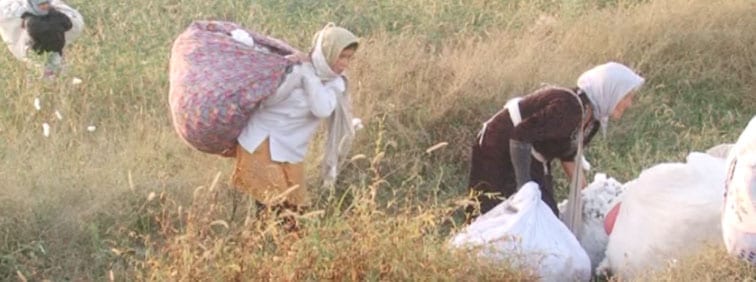At least one person has died in Uzbekistan cotton fields so far this season, part of the country’s massive mobilization of compulsory labor in which nurses, teachers, students and state employees are forced from clinics and classrooms to toil for weeks picking cotton.
Komiljon Asimov, 20, a biology student at Abduhab State University, died September 11, days after university students were the first group mobilized by the Uzbek government for the fall cotton harvest. In another incident, Dilarom Juraev, 28, suffered a miscarriage in the fields.
Each harvest, Uzbekistan mobilizes more than 1 million residents to pick cotton through systematic coercion. From September through October, many classrooms shut down because teachers are among those forced to pick cotton. Health clinics and hospitals are unable to function fully with so many health care workers also toiling in the fields.
‘You Work Like a Slave from Morning to Night’
“Dinner takes place in the field again. For the dinner we are normally given watery soup,” writes one university economics student from the Andijan Agricultural Institute, who is now picking cotton. “I have no strength left. You work like a slave from morning till night, not enough food, and should sleep and wake up hungry again.”
The student, whose story was collected by the Uzbek-German Forum (UGF), describes being forced from her studies with other classmates to take part in the government-led mobilization. They are housed in a local school building emptied of students, where they sleep on a cold floor, with no showers and limited sanitary facilities.
The student says she spent hundreds of dollars of her family’s money buying food and warm clothing to prepare for working some two months in the cotton fields. Nearly 10,000 students from the four universities in the Andijan region were forcibly sent to work starting September 8.
Uzbeks Coerced into Signing ‘Voluntary Participation’ Letters
Last year, the government went to extreme measures—including jailing and physically abusing researchers independently monitoring the process—to cover up its actions. This year, the tactic appears to be widespread coercion of students, health care workers and others to sign letters indicating they are “voluntarily” participating in the cotton harvest, according to UGF. Employees are told they will lose their jobs and students threatened that they will be expelled from the university if they do not pick cotton or agree to gathering a set weight of cotton each day.
In one video, Alia Madalieva, the head nurse at Clinic No. 8 in Kokand City, dictates to employees the text for their “letter of commitment.” Seated next to a clinic employee in the cotton fields, she dictates: “If I do not collect 50 kg (kilograms) of cotton a day, I will voluntarily hand in my letter of resignation. I wrote this on my own.”
Uzbekistan and Turkmenistan, another country where forced labor in cotton harvests is rampant, this year were downgraded to the lowest ranking in the U.S. State Department’s 2016 Trafficking in Persons Report. Uzbekistan, which gets an estimated $1 billion per year in revenue from cotton sales, also forces farmers to plant state-ordered acreage of cotton and wheat or face the loss of their land.
More personal stories from those forced to pick cotton and other documentation are available at UGF’s new microsite. The UGF is a member of the Cotton Campaign, as is the Solidarity Center, The campaign works to end the injustice of forced labor in cotton harvesting in Uzbekistan and Turkmenistan.

